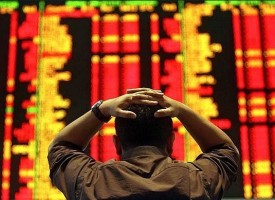On the heels of the defeat of the Swiss Gold Initiative, today a 40-year market veteran sent King World News a powerful piece discussing the unprecedented events we are witnessing in the gold, silver, and oil markets as well as what investors should be doing in this dangerous environment. Below is what Robert Fitzwilson, founder of The Portola Group, had to say in this exclusive piece for King World News.
By Robert Fitzwilson of The Portola Group
December 1 (King World News) – World Being Driven By Madness Of Western Central Planners
The U.S. Thanksgiving holiday dished up not only traditional turkeys for feasting, but one of another kind from the OPEC meeting in Vienna. Friday, the day after Thanksgiving shopping known as “Black Friday” by the retailers and shoppers, turned into a true black Friday for investors in the energy sector. During a shortened trading session for the holiday, prices tumbled not only for oil, but virtually any publicly traded shares involved in any aspect of the energy business….
Continue reading the Robert Fitzwilson piece below…
Advertisement
UPDATE: To hear the man with over 40 years of experience in the resource
markets and how he is positioning his clients to weather
the current financial storm click on the logo:

The meme that we have been dished is that there is an oversupply of oil and that demand has been flagging. We hear that the U.S. shale oil industry has been largely responsible for the purported oversupply, so OPEC and the Saudis are deliberately lowering prices to do everything from limiting shale oil growth to bankrupting the companies engaged in fracking.
While the shale oil output growth in the U.S. has been dramatic, the incremental production is relatively small when compared to global output and demand. Both global supply and demand for energy have been running in the low 90 million barrel per day range. On a year-over-year basis, estimates that we trust are showing an increase in demand of nearly 3 million barrels per day. The U.S. output growth is fantastic, but the world needs it to keep up with increasing demand and supplies that are becoming more and more tenuous due to the various geopolitical events occurring in North Africa, the Middle East, Venezuela and Nigeria. In addition, Mexican production appears to be on an irreversible long-term slide in output.
So, the price decline seen in the last 4 months apparently cannot be blamed on an honest comparison of supply and demand. The meme is not true. The official data has been manipulated once again to give the impression of weaker demand. The term “missing oil” has been applied when these circumstance arise. The oil is not missing, of course. Subsequent revisions of the “official” data will ultimately reflect it, but not until the powers that be make it so.
The reason given for the OPEC announcement was that none of the other participants were willing to go along with cuts to which Saudi Arabia was open. It makes sense. Saudi Arabia produces 9-10 million barrels per day, and an increasing and alredy large portion of that is consumed for domestic purposes. Even if they alone cut production by 1 million barrels per day, relative to global demand, it would likely have a negligible long-term impact. It would simply cut down on their export revenues after an equally severe decline due to a $40 price reduction.
Lower prices on lower volume would make an already problematic domestic budget situation worse. It might have been rational if the global supply was overrunning global demand in prior crises, but that is not the case. Even before the declines on Friday, the prior decline had taken an annual bite out of the Saudi budget estimated to be about $100 billion from their expected realized price. It would seem to be self-destructive to set in motion another large decline unless there were no other alternative available in Vienna.
So we have a bit of a “whodunit”. From our assessment, the perpetrator is most likely the same group that has engineered the declines in the metals and mining company shares. The tools to kick off the decline no doubt were the derivatives used to trade “financial oil”. Given the 20-to-1 ratio in trading of financial oil to physical oil (at least), it would not take much to trigger a gradual decline that has now turned into a rout.
Our suspicion is that the intention was to lower oil and therefore gas prices prior to the U.S. elections, as well as giving Russia a poke in the eye to boot. For central planners, everything looks like a lever with a graduated dial. It is in their DNA to believe that they can pull the levers and generate a linear reaction in whatever direction they wish. The trouble is that it rarely works in practice, at least to the downside. There is an old saying that bull markets climb the staircase and bear markets take the elevator shaft. This is particularly true for such a large and leveraged market as the trading in energy.
It has also been surmised that the impact on the consumer from the declining gas prices is the incantation of QE4. It might have been part of the central planning grand plan, but it is not clear how that works out. It is true that consumers will spend less for gas, but whether or not the extra money is spent or used to pay down debt is unknown. It is a zero sum game. The $trillion or so saved on energy is also coming out of the hide not only of OPEC, but also the companies and workers in the U.S. shale oil industry. That $trillion would have been likely placed into financial assets by the energy producers and reinvested in expanding shale oil operations worldwide. Instead, there will most assuredly be a flow out of financial assets to cover government budget deficits, and that is not good for financial markets if sustained.
Late in the trading on Friday, the derivatives were unleashed against the precious metals and the mining shares on cue. While Friday is traditionally a day for the central planners to attack, there were additional motivations behind the attack. The Swiss referendum was held today, and perhaps the decline of Friday was another attempt to frighten Swiss voters into saying “No”. Given the overwhelming rejection of the referendum, the propaganda campaign was clearly effective. Apparently, the Swiss “firewall” was simply a memory of days gone past. Now it’s “All aboard” the Keynesian Express.
But the facts lined up for higher metal prices are manifold. There is a hint that central banks in Europe might be reacquiring gold in case there is a move away from the Euro back to traditional national currencies. India moved to ease restrictions on legitimate imports of gold last week. Supply and demand for precious metals remains extremely tight, etc.
The central planners have now gone “all in”. Investors in both energy and precious metals must suffer through their incessant manipulations until the central planners are overwhelmed by economic reality. When the markets are once again able to perform price discovery, the upside potential for both will be quite dramatic. Until then investors need to be patient as the world continues to hurtle into uncharted territory, driven by the madness and massive egos of Western central planners.
IMPORTANT – KWN has many more interviews being released today.
© 2014 by King World News®. All Rights Reserved. This material may not be published, broadcast, rewritten, or redistributed. However, linking directly to the blog page is permitted and encouraged.
The audio interviews with Rick Rule, Bill Fleckenstein, Ben Davies, Greyerz-Turk-Stamm, Gerald Celente, David Stockman, William Kaye, Dr. Paul Craig Roberts, Andrew Maguire, Eric Sprott, Rick Santelli, Michael Pento, John Mauldin and Marc Faber are available now. Other recent KWN interviews include Jim Grant and Felix Zulauf — to listen CLICK HERE.






